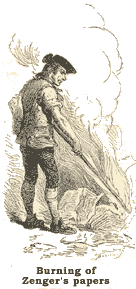Tensions between the popular forces and the establishment continued to grow as New York moved into the 18th century. A case in point involved John Peter Zenger (1697-1746), a German immigrant who had come to American as an apprentice printer.
 By 1735, Zenger had become the editor of the New York Weekly Journal and developed a reputation for sympathy with the popular side of public issues. In that year, Zenger was brought to trial on charges of printing false and seditious statements about colonial officials.
James Alexander was Zenger's original counsel, until he was found in contempt of court and removed from the roster of attorneys. Zenger's next lawyer was
Andrew Hamilton. Hamilton put forward an defense theory that is now considered obvious but which at the time was novel. He argued that Zenger's statements, even if defamatory, were not libelous because they were true.
Despite clear instructions from the judge to the contrary, the jury found Zenger innocent of all charges. The Zenger case had far reaching impacts by promoting the idea that freedom of the press was a right. In 1765, it was cited by those protesting against the Stamp Act.
By 1735, Zenger had become the editor of the New York Weekly Journal and developed a reputation for sympathy with the popular side of public issues. In that year, Zenger was brought to trial on charges of printing false and seditious statements about colonial officials.
James Alexander was Zenger's original counsel, until he was found in contempt of court and removed from the roster of attorneys. Zenger's next lawyer was
Andrew Hamilton. Hamilton put forward an defense theory that is now considered obvious but which at the time was novel. He argued that Zenger's statements, even if defamatory, were not libelous because they were true.
Despite clear instructions from the judge to the contrary, the jury found Zenger innocent of all charges. The Zenger case had far reaching impacts by promoting the idea that freedom of the press was a right. In 1765, it was cited by those protesting against the Stamp Act.